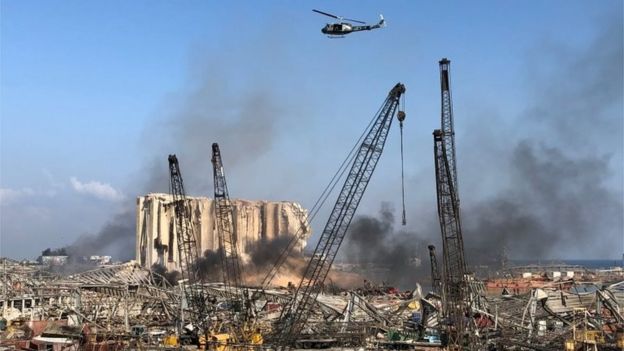Rescue workers in Lebanon are searching for more than a hundred people who are missing after a huge explosion devastated the port area of the capital Beirut on Tuesday.
The blast killed at least 100 people and injured more than 4,000 others.
The whole city was shaken by the explosion and a mushroom cloud could be seen spreading over the port area.
President Michel Aoun said the blast was caused by 2,750 tonnes of ammonium nitrate stored unsafely in a warehouse.
Ammonium nitrate is used as a fertiliser in agriculture and as an explosive.
He scheduled an urgent cabinet meeting for Wednesday, and said a two-week state of emergency should be declared.
The country will observe an official period of mourning for three days from Wednesday.
What happened?
The explosion occurred just after 18:00 (15:00 GMT) on Tuesday after a fire at the port.
Eyewitness Hadi Nasrallah says that he saw the fire but did not expect the blast. "I lost my hearing for a few seconds, I knew something was wrong, and then suddenly the glass just shattered all over the car, the cars around us, the shops, the stores, the buildings. Just glass going down from all over the building," he told the BBC.
BBC Arabic reporter Maryem Taoumi was conducting a video interview in Beirut with a member of the Moroccan Agency for Sustainable Energy at the time of the explosion.
The following video shows Ms Taoumi, who is now safe, being knocked over by the force of the blast.
شاهد تغطية مباشرة من تلفزيون بي بي سي نيوز عربي https://t.co/GbrKNjtyYZ
— BBC News عربي (@BBCArabic) August 4, 2020
The BBC's Lina Sinjab said she could feel the wave of the explosion from her home, a five-minute drive from the port area. "My building was shaking, it was about to fall, all windows were forced open," she said.
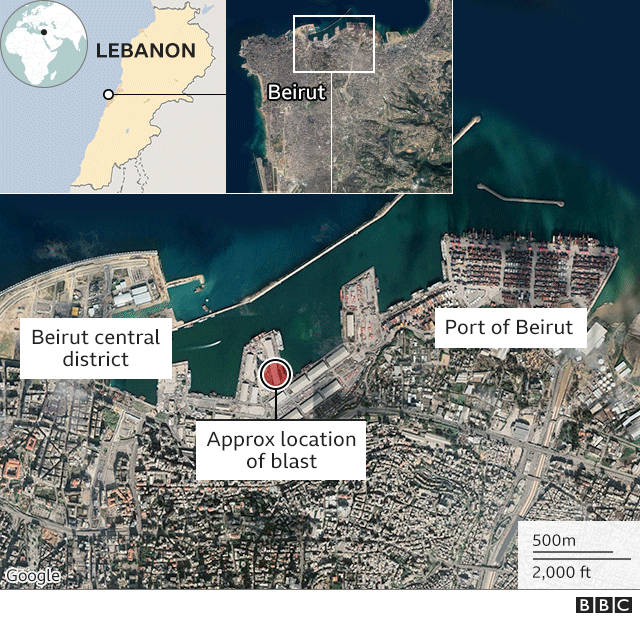
The blast was also felt 240km (150 miles) away on the island of Cyprus, in the eastern Mediterranean, with people there saying they thought it was an earthquake.
BBC journalist Rami Ruhayem said there was chaos in the aftermath of the blast as ambulances with their sirens wailing inched their way through heavy traffic to get to the site.
There were shards of glass on the highway, that needed to be cleared by tractors, he added.
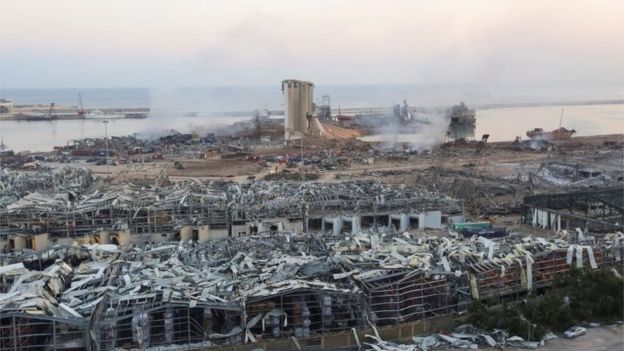
Local media showed people trapped beneath rubble and video footage showed wrecked cars and blast-damaged buildings. Hospitals were said to be overwhelmed.
The head of Lebanon's Red Cross, George Kettani, described it as a "huge catastrophe", adding: "There are victims and casualties everywhere."
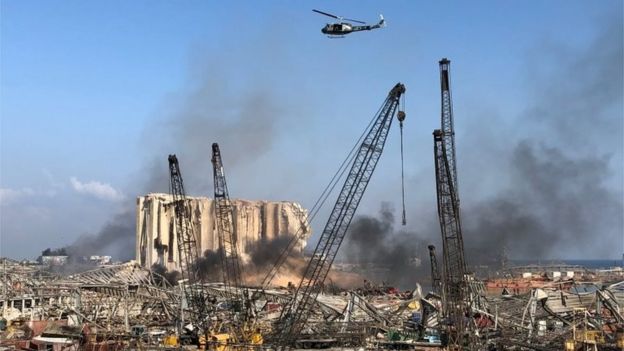
His organisation said that a search and rescue operation was still under way to locate the more than 100 people missing.
The head of Rafik Hariri University Hospital in Beirut, Firass Abiad, told the BBC there had been "extremely chaotic" scenes in the aftermath of the blast.
"We had tens of casualties arriving at the emergency room at the same time and initially they were mainly people who had injuries from glass," he said.
"We are hoping to find survivors although the hope is getting dimmer by the minute."
Journalist Sunniva Rose said there was still smoke going up into the sky late into Wednesday evening. "The whole city was black. It was very hard to walk around, people were covered in blood. I saw an 86-year-old woman being treated by a doctor who had just run out of his home with a first aid kit."
What triggered it?
Officials said that an investigation was under way to find the exact trigger which caused the ammonium nitrate - which had reportedly been stored in a warehouse after it was unloaded from a ship impounded at the port in 2013 - to explode.
Ammonium nitrate
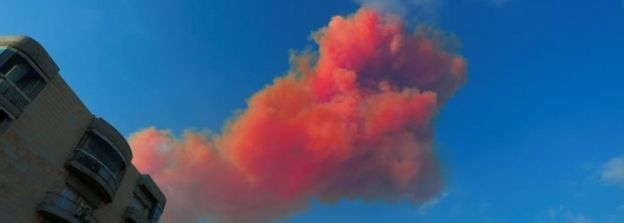
- Common industrial chemical used mainly as fertiliser in agriculture
- Also one of the main components in explosives used in mining
- Not explosive on its own ignites only under the right circumstances
- When it explodes, it can release toxic gases including nitrogen oxides and ammonia gas
- Strict rules on how to store it safely: site has to be fire-proofed, and not have any drains, pipes or other channels in which ammonium nitrate could build up

British former intelligence officer Philip Ingram told the BBC's Today programme that ammonium nitrate could only be turned into an explosive substance under certain circumstances.
Mr Ingram said that safely stored it was relatively safe but that in confined space and when contaminated with items such as fuel oil it could cause an explosion.
Lebanon's Supreme Defence Council said those found responsible for the explosion would face the "maximum punishment" possible.
What's the background?
The explosion comes at a sensitive time for Lebanon. With Covid-19 infections on the rise, hospitals were already struggling to cope. Now, they are faced with treating thousands of injured people.
The country is also going through an economic crisis. Lebanon imports most of its food and large quantities of grain stored in the port have been destroyed causing fears of widespread food insecurity to come.
The future of the port itself is in doubt due to the destruction caused and with many building and homes reduced to an uninhabitable mess of glass and debris many residents have been left homeless.
President Aoun announced that the government would release 100 billion lira (£50.5m; $66m) of emergency funds but the impact of the blast on the economy is expected to be long-lasting.
The blast happened close to the scene of a huge car bombing which killed former Prime Minister Rafik Hariri in 2005. A verdict is due in the trial of four men accused of orchestrating the attack on Mr Hariri at a special court in the Netherlands.
Even before the blast, tensions were high in Lebanon, with street demonstrations against the government's handling of the worst economic crisis since the 1975-1990 civil war.
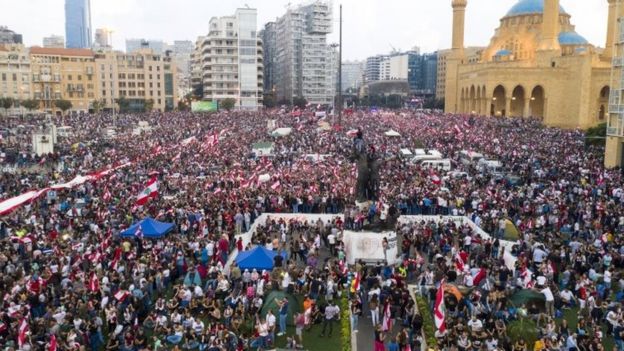
Many blame the ruling elite who have dominated politics for years and amassed their own wealth while failing to carry out the sweeping reforms necessary to solve the country's problems. People have to deal with daily power cuts, a lack of safe drinking water and limited public healthcare.
There has also been tension on the border with Israel, which said last week that it had thwarted an attempt to infiltrate Israeli territory by Hezbollah, a militant Shia Islamist organisation that wields considerable power in Lebanon.
But a senior Israeli official has told the BBC that "Israel has no connection" to the Beirut blast.
Latest Stories
-
Bawumia’s 8 minutes elite ball that quenched thirst of gun happy politicians
10 minutes -
It will be a betrayal if National Cathedral saga does not feature in ORAL’s work – Ablakwa
20 minutes -
‘It’s unfortunate we had to protect the public purse from Akufo-Addo’ – Ablakwa on ORAL Team’s mission
1 hour -
Congo lawyers say Apple’s supply chain statement must be verified
1 hour -
Stampede in southwestern Nigerian city causes multiple deaths
2 hours -
Tens of thousands without water in Mayotte as curfew brought in
2 hours -
ORAL: We won’t witch-hunt, we’ll focus on transparency, not revenge – Ablakwa
2 hours -
Attempted robbery: Accused claims he carried cutlass for protection
3 hours -
Excavator operator jailed for stealing
3 hours -
African fans age-shame me for putting on some outfits – Tiwa Savage
3 hours -
Tiwa Savage criticised by female fans for stance on cheating in relationships
3 hours -
Bank of England expected to hold interest rates
4 hours -
Congo river boat sinks killing at least 22
4 hours -
Nigeria approves Shell’s $2.4 billion asset sale to Renaissance
4 hours -
Embattled Liberian speaker questioned by police over parliament fire
5 hours

